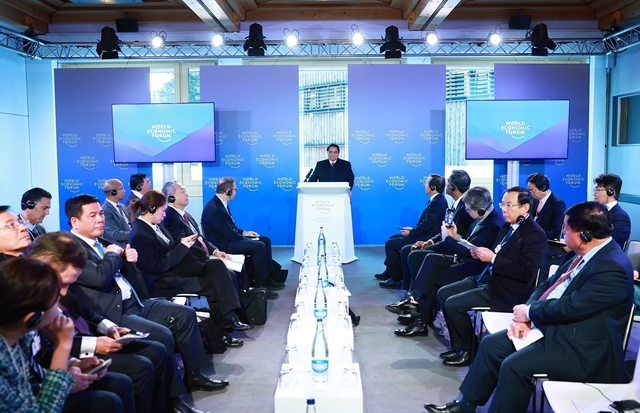 |
| Prime Minister Phạm Minh Chính addresses the Việt Nam’s National Strategy Dialogue themed "Unleashing Việt Nam's growth potential: Promoting investment and innovation for a strong future". VNA/VNS Photo |
DAVOS Prime Minister Phạm Minh Chính has affirmed that Việt Nam will focus on renewing traditional growth drivers such as investment, export, consumption and promote new drivers including the digital economy, the circular and sharing economy, to unleash growth potential with an aim to realise strategic goals by 2030 and 2045.
He was speaking in Davos on Tuesday at the Việt Nam’s National Strategy Dialogue themed 'Unleashing Việt Nam's growth potential: Promoting investment and innovation for a strong future'.
Attending the dialogue were World Economic Forum (WEF)’s Head of Regional Agenda for Asia-Pacific Joo-Ok Lee and more than 60 leaders of global corporations, which are also WEF members.
This is one of the few national dialogue activities held at the WEF Daos this year and is the fourth National Strategy Dialogue that WEF has organised with Việt Nam.
The attending representatives of corporations expressed their strong impression with the Việt Nam’s economic growth rate of over seven per cent in 2024 and the management outcomes of the Vietnamese Government, within the context of the world economy facing many challenges. The corporations highly appreciated the attractive investment opportunities of the Vietnamese economy.
They want to learn about Việt Nam's mechanisms and policies to encourage investors to participate in areas such as infrastructure, liqied gas, healthcare, oil and gas industry, hotels as well as policies to ensure power sources, clear procedures to implement projects, ensure human resources and remove export restrictions in some important markets of Việt Nam.
Analysing the Việt Nam’s growth potential, PM Chính highlighted the self-reliance of the economy when it has to cope with difficulties due to being a transitional economy, with a modest economic scale and large openness, and facing natural disasters and climate change that caused a lot of damage, especially Typhoon Yagi.
The typhoon reduced the country’s GDP growth by about 0.15-0.2 per cent in 2024, but Việt Nam still exceeded all 15 out of 15 socio-economic development targets, he said.
He said Việt Nam will take science and technology, innovation and digital transformation as new driving forces.
“In 2025, Việt Nam will continue to prioritise promoting growth associated with maintaining macroeconomic stability, controlling inflation, ensuring major balances of the economy, striving to achieve a growth rate of at least eight per cent this year and reaching double digits in the following years,” he said.
Việt Nam will focus on three strategic breakthroughs :institutions, infrastructure and human resources towards open institutions, transparent infrastructure and smart human resources and governance.
Việt Nam looks to make breakthroughs in building synchronous and modern infrastructure including both hard and soft infrastructure and infrastructure in transport, energy, climate change response, healthcare, education, sports, as well as digital and social infrastructure, he said.
Chính shared with participants about Việt Nam’s key infrastructure projects including the plan to complete the North-South high-speed railway in about ten years, the anticipated construction of the railway project connecting with China this year, the building of nuclear power plants in five years and the goal of finishing at least 3,000km of expressways in 2025.
“Việt Nam is set to make a breakthrough in human resources, especially training high-quality resources in emerging industries and fields in the digital age such as semiconductor chips, artificial intelligence, cloud computing, internet of things, optoelectronics to meet the needs of businesses and investors and improve labour productivity,” he said.
Chính affirmed that Việt Nam will continue to strongly promote internal resources including people and nature, especially exploiting new development spaces such as marine space, underground space, outer space and cultural and historical traditions. Việt Nam determines to develop rapidly but sustainably, taking people as the centre, not sacrificing progress, fairness, social security and the environment to pursue merely economic growth.
Responding to the participants’ concerns in the semiconductor sector, he said Việt Nam has implemented a training programme for 50,000 semiconductor engineers and is committed to no shortage of electricity with synchronous solutions, including developing wind power, solar power, nuclear power and importing electricity.
Regarding the concerns about the real estate sector, he said Việt Nam will continue to improve institutions and laws on land and real estate associated with strategic infrastructure development in order to open up new development spaces and encourage investors to the one million social housing apartment project.
He requested that partners and investors continue to accompany and cooperate with Việt Nam in priority development areas and in giving feedback on building and perfecting institutions, attracting high-quality investment and providing financial incentives. VNS
(责任编辑:Cúp C1)
 Cầu thủ Huy Hùng và bạn gái khoe ảnh cưới lãng mạn
Cầu thủ Huy Hùng và bạn gái khoe ảnh cưới lãng mạn Soi kèo Manchester United vs AS Roma, 02h00
Soi kèo Manchester United vs AS Roma, 02h00 Nhận định, soi kèo Sporting San Jose vs Puntarenas, 08h00 ngày 1/10: Cơ hội cho đội khách
Nhận định, soi kèo Sporting San Jose vs Puntarenas, 08h00 ngày 1/10: Cơ hội cho đội khách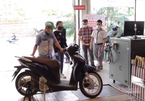 Soi kèo Sevilla vs Real Betis, 03h00 – 12/06/2020
Soi kèo Sevilla vs Real Betis, 03h00 – 12/06/2020Asiad 2018: Bùi Trường Giang tiết lộ bất ngờ về tấm HCB Asiad
 - Bước vào trận chung kết hạng 56kg tán thủ (wushu) với đối thủ người Trung Quốc, Bùi Trường Giang
...[详细]
- Bước vào trận chung kết hạng 56kg tán thủ (wushu) với đối thủ người Trung Quốc, Bùi Trường Giang
...[详细]Soi kèo Bồ Đào Nha vs Pháp, 02h45
 Soi kèo Bồ Đào Nha vs Pháp – trận đấu thuộc UEFA Nations League A mùa giải 2020/2021 cùng các chuyên
...[详细]
Soi kèo Bồ Đào Nha vs Pháp – trận đấu thuộc UEFA Nations League A mùa giải 2020/2021 cùng các chuyên
...[详细]Nhận định, soi kèo Chennaiyin vs Mohammedan, 21h00 ngày 26/9: Chia điểm
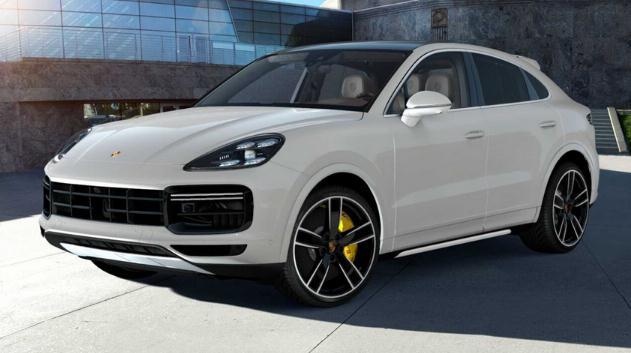 Nguyễn Quang Hải - 26/09/2024 09:02 Nhận định
...[详细]
Nguyễn Quang Hải - 26/09/2024 09:02 Nhận định
...[详细]Nhận định, soi kèo Al Fayha vs Al Riyadh, 22h25 ngày 29/9: Cửa dưới thắng thế
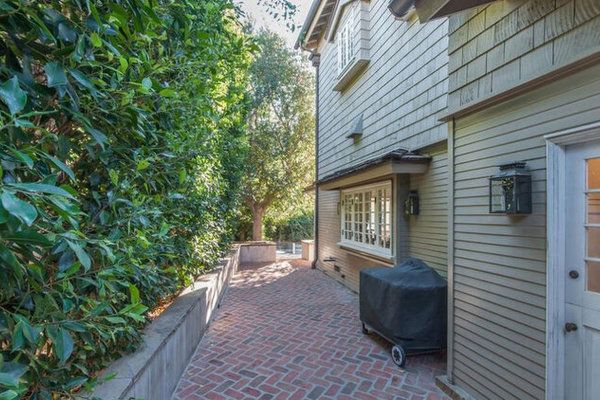 Hư Vân - 29/09/2024 04:30 Nhận định bóng đá g
...[详细]
Hư Vân - 29/09/2024 04:30 Nhận định bóng đá g
...[详细]Hot boy phòng gym tìm được tình yêu trên đường phố sau 2 lần thất bại
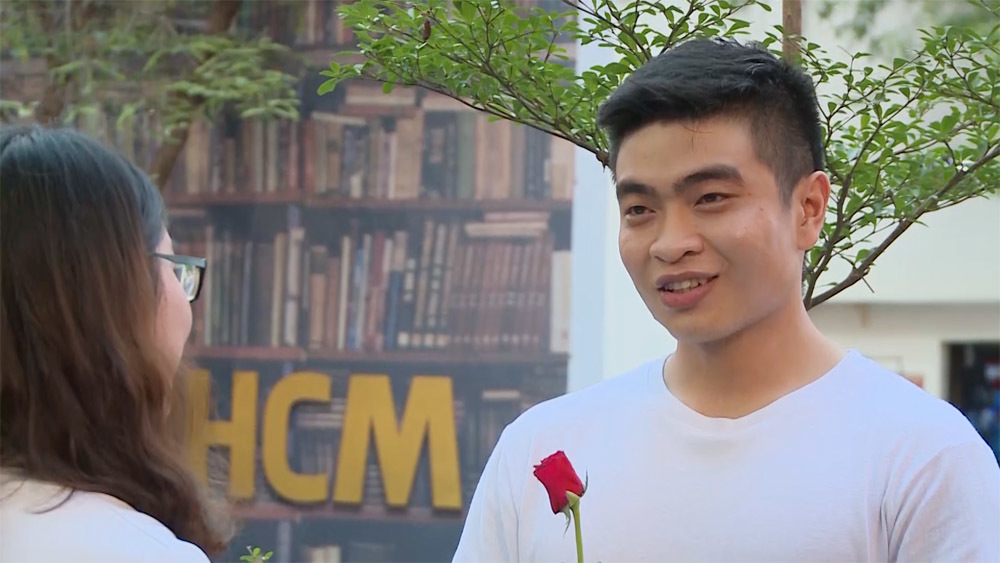 'Mai mối cùng người lạ' - là một chương trình hẹn hò mới dành cho các cặp đôi.Nếu tại Bạn muốn hẹn h
...[详细]
'Mai mối cùng người lạ' - là một chương trình hẹn hò mới dành cho các cặp đôi.Nếu tại Bạn muốn hẹn h
...[详细]Nhận định Italia vs Tây Ban Nha, 02h00
Nhận định, soi kèo Al Karma vs Al
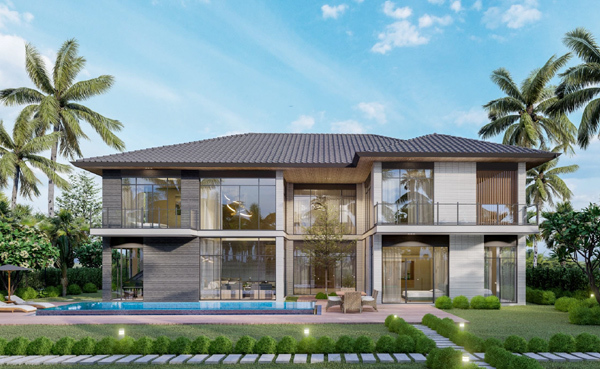 Pha lê - 25/09/2024 15:51 Nhận định bóng đá g
...[详细]
Pha lê - 25/09/2024 15:51 Nhận định bóng đá g
...[详细]Soi kèo Brighton vs Manchester City, 02h00
 Soi kèo Brighton vs Manchester City, trận đấu giải Ngoại hạng Anh mùa giải 2019/20 cùng các chuyên g
...[详细]
Soi kèo Brighton vs Manchester City, trận đấu giải Ngoại hạng Anh mùa giải 2019/20 cùng các chuyên g
...[详细]Tuyệt đỉnh song ca nhí tập 8 Cẩm Ly
 - Huỳnh Lập, Cẩm Ly nức nở tâm sự chuyện quá bận rộn đến không thể dành thời gian ở bên cha mẹ.Chươn
...[详细]
- Huỳnh Lập, Cẩm Ly nức nở tâm sự chuyện quá bận rộn đến không thể dành thời gian ở bên cha mẹ.Chươn
...[详细]Nhận định Malaysia vs Việt Nam, 23h45
 Nhận định Malaysia vs Việt Nam – trận đấu thuộc giải Vòng loại World Cup 2022 KV Châu Á mùa giải 202
...[详细]
Nhận định Malaysia vs Việt Nam – trận đấu thuộc giải Vòng loại World Cup 2022 KV Châu Á mùa giải 202
...[详细]